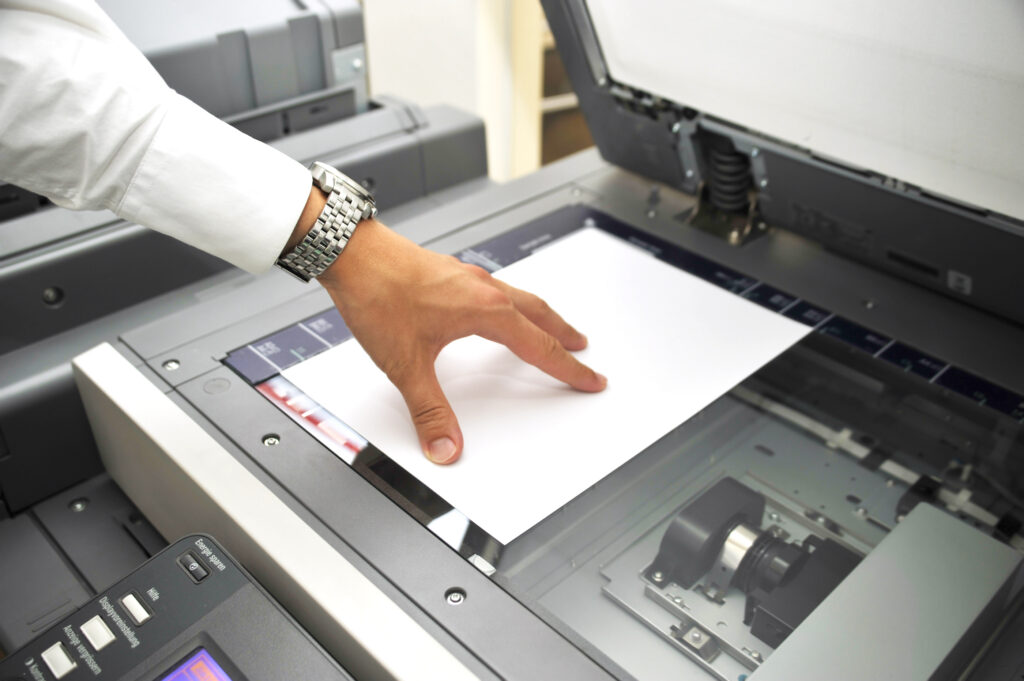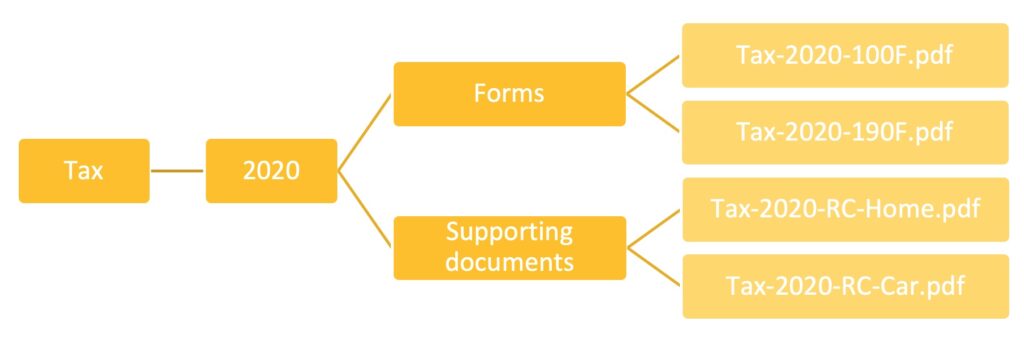Managing your documents properly in the digital era
Going paperless is more eco-friendly and takes up less space; it offers numerous advantages for individuals. However, this approach requires you to be well organised. How can you obtain or generate these electronic documents? For how long and in what format should you keep them? myLIFE provides a few tips to help you manage your administrative paperwork in digital format.
After years of accumulating his letters and administrative documents in files and other cardboard boxes, Oliver has decided to review his filing method. It is becoming increasingly common in today’s digital era to replace paper documents with electronic files. This offers numerous advantages: lower risk of loss or damage, space savings, swift and easy access, and a positive environmental impact.
However, if Oliver decides to switch to electronic documents for some of his administrative files, he must take precautions to ensure a smooth transition to a digital format.
Sort it out!
The first thing Oliver needs to do is to sort out his various papers. To help him decide what he should hold on to, he can use the limitation periods relating to the associated rights and duties as a basis. When does a document become ineffective for enforcing a right? For how long can such a right be demanded? The following table provides a non-exhaustive list of the minimum retention period for the main administrative documents in Luxembourg.
Retention period for administrative documents for an individual in Luxembourg
| DOCUMENTS | RETENTION PERIOD | EXPLANATIONS | |
|---|---|---|---|
| TAXES | Tax returns (direct taxes and VAT) | 5 years | In practice, the tax authority has to issue a tax statement before the end of the limitation period: 5 years for direct taxes (paragraph 144 of the General Tax Law) and for VAT (article 81 of the VAT Law). |
| Supporting documentation for a tax return (in the event of non-declaration for direct taxes) | 10 years | For direct taxes, in the event of non-declaration or additional taxes on an incomplete or inaccurate statement, with or without fraudulent intent, the limitation period is 10 years (article 10, Law of 27 November 1933, as amended by the Law of 24 December 1999). | |
| SOCIAL SECURITY | Documents supporting entitlement to a pension or the reimbursement of healthcare costs | 5 years | For arrears of pensions and other social benefits, the limitation period is 5 years from the start of the benefits entitlement. |
| INSURANCE | Insurance policies | Term of the contract + 3 years or 5 years | The limitation period for any action in connection with an insurance contract is 3 years from the claim event. It is 5 years if the policyholder can prove that they were not aware of the claim event at an earlier date: 5 years from the claim event is the final deadline (article 44 of the Law of 27 July 1997). |
| WORK | Payslips, unemployment benefits, employment contracts, dismissal notices | Until entitlement to a pension | |
| Title deeds | Holding period of assets | No formal obligation as the deeds are registered and held with the notary (fees may be charged for the filing service). | |
| PROPERTY | Service charges | 5 years | Article 2277 of the Luxembourg Civil Code |
| Condominium fees | 5 years | Article 24 of the Law of 16 May 1975 on the status of co-ownership of buildings. | |
| MOVABLE ASSETS | Equipment invoices | Holding period of assets | In the event of damage, theft, etc. Evidence of the value of the movable assets is required to estimate the damage suffered and to support a claim. |
Source : SD Law – Mr Dekhar
Collecting the digital and paper documents
To start filing his documents in digital format, Oliver must activate the paperless option with any organisations offering this service. He can then collect the digital documents and create a digital copy of any original printed documents.
> Documents sent directly in digital format
Administrations and companies are increasingly offering their clients paperless documentation: bank statements, insurance certificates, payment notices, telephone and energy bills, etc.
Oliver can access these directly from his personal page on the website of his bank, insurance company, telephone provider, etc. Otherwise, he can contact these various service providers to ask if this option is available. He can also ask for these documents to be emailed to him if possible. Papers that are sent digitally by an administration are considered as certified copies and have the same legal value as an original.
Oliver must remember to download these documents regularly and to file them himself, as some administrations only make them available for a limited period.
→ To access your personal online space with an administration, remote bank, e-commerce site, etc., you will need to use unique passwords. Oliver can use a password manager to save all of these in a secure location. This is a secure and practical solution, providing that a trustworthy provider is used!
| Luxembourg is moving towards the full digitalisation of government departments
Luxembourg created a dedicated Ministry for Digitalisation in 2018 and is continuing to develop a trustworthy and secure system of paperless government. The country already offers many services online and citizens are able to consult and download eDocuments. This is the case for the MyGuichet.lu platform: by using the eDelivery function, citizens can access their income tax assessments, family allowance statements, road tax invoices, details of health insurance reimbursements, etc. Another example is the eSante.lu website where you can access your medical documents via shared medical files (Dossier de Soins Partagé ,DSP): prescriptions, lab results, medical imaging results, etc. |
> Documents for scanning
Any papers that cannot be obtained in digital format will require scanning. Oliver can use a scanner connected to his PC, tools on his smartphone or a dedicated mobile app (several of these can be found in app stores). The document should be scanned in high resolution (generally 300 dpi) to ensure optimal legibility, and it should be filed in an accessible format that preserves its formatting (e.g. PDF).

Oliver must keep the paper versions of his documents, as any scans he has made himself do not have the same legal value as originals.
NB: Oliver must keep the paper versions of his documents, as any scans he has made himself do not have the same legal value as originals. They are considered copies!
| Useful info: in Luxembourg, the Law of 25 July 2015 on electronic archiving allows companies to accord the same value to a digital copy as to an original paper document. This requires the copy to respect a certain number of criteria and have been created by a legal person with the status of a Luxembourg PSDC (Prestataire de Services de Dématérialisation ou de Conservation). |
Classification and storage of digital documents
Classification
After collecting the documents, Oliver can organise the various files. He should give the documents clear names and organise them into folders and sub-folders.
Example:

This document hierarchy will help Oliver to easily locate his electronic files. To avoid any access or display issues he should avoid using spaces, accents or special characters in document names (figures, capitals and dashes are no problem).
→ Once he has defined his organisational structure, Oliver will be able to file his documents as and when he receives them. This means that his archives will be permanently up to date.
The storage medium used for the files must by reliable and durable in order to protect the data.
Storage
Oliver must take particular care in storing his files. The storage medium used for the files must by reliable and durable in order to protect the data. He should choose an option based on the frequency with which he will need to access them, the number of files to be stored, the desired level of security and his budget.
External storage:
-
- A USB key is easy to transport. This is both an advantage and a disadvantage, as it can be damaged or lost. It is generally not too expensive, but the price will vary depending on the amount of storage available and the file transfer speed. Don’t forget that not all models are equal!
- CDs, DVDs and Blu-rays may be attractive given their reliability and price. However, the stored data can be affected by the slightest scratch. And on top of this, an increasing number of computers no longer have disc readers.
- External hard drives: HDDs (hard disk drives) offer high storage capacity at a reasonable price, but can be easily damaged by a knock. SSDs (solid state drives) are more resistant and faster, but cost more. Neither is immune to computer viruses!
The durability of these storage devices varies, with factors like the frequency of use and their storage conditions playing a key role.
→ To make the data secure, Oliver can encrypt the files and/or protect his external devices with a password using dedicated software or solutions included on his PC.
It is a good idea to store the data in several different media.
Online storage:
-
- The Cloud is a remote storage system accessed via the internet. It is reliable and fast and offers variable amounts of storage based on the subscription fee. Documents can be accessed from anywhere and using any device (computer, tablet, smartphone) providing you have internet access. However, this solution is exposed to hackers and technical failures of the server providers.
- A digital safe allows you to rent storage space at a provider (banks, insurers, companies, etc.) offering a high level of security and confidentiality. Data is encrypted and stored on protected servers that can only be accessed by authorised persons. It may be free or fee-based, depending on the level of service and security chosen, and it guarantees the integrity of the filed documents (date and time of filing, logging of when files are consulted or changed, etc.). Other services such as the automatic repatriation of documents may also be offered.
It is worth carrying out checks on online service providers before choosing one of these storage systems!
NB: it is a good idea to store the data in several different media in order to limit any damage in the event of loss, device theft, computer viruses or bankruptcy of the service provider.
Oliver is now familiar with the key information that will help him make the switch to the digital management of his electronic documents. Although this may seem long and fiddly, it will help him save precious time in the future. Good luck!


 Mortgage
Mortgage Personal loan
Personal loan Savings
Savings